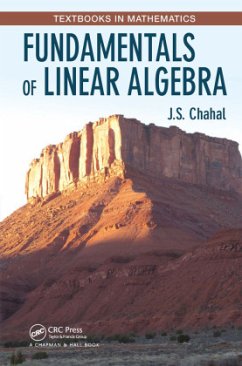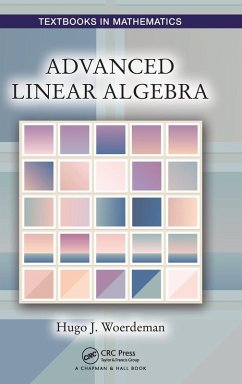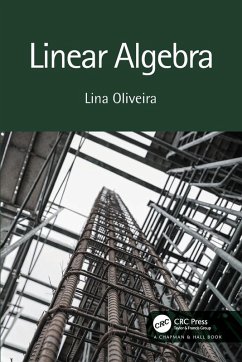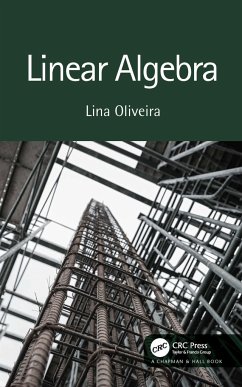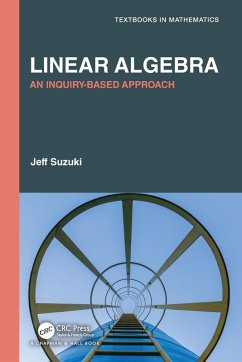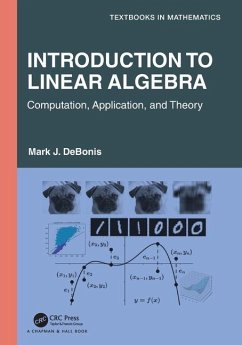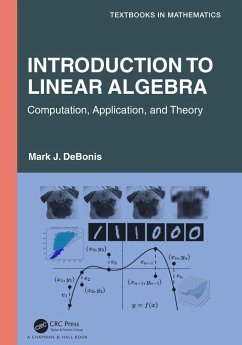
Linear Algebra
Versandkostenfrei!
Versandfertig in 6-10 Tagen
61,99 €
inkl. MwSt.
Weitere Ausgaben:

PAYBACK Punkte
31 °P sammeln!
Linear Algebra, James R. Kirkwood and Bessie H. Kirkwood, 978-1-4987-7685-1, K29751Shelving Guide: MathematicsThis text has a major focus on demonstrating facts and techniques of linear systems that will be invaluable in higher mathematics and related fields. A linear algebra course has two major audiences that it must satisfy. It provides an important theoretical and computational tool for nearly every discipline that uses mathematics. It also provides an introduction to abstract mathematics.This book has two parts. Chapters 1-7 are written as an introduction. Two primary goals of these chapt...
Linear Algebra, James R. Kirkwood and Bessie H. Kirkwood, 978-1-4987-7685-1, K29751
Shelving Guide: Mathematics
This text has a major focus on demonstrating facts and techniques of linear systems that will be invaluable in higher mathematics and related fields. A linear algebra course has two major audiences that it must satisfy. It provides an important theoretical and computational tool for nearly every discipline that uses mathematics. It also provides an introduction to abstract mathematics.
This book has two parts. Chapters 1-7 are written as an introduction. Two primary goals of these chapters are to enable students to become adept at computations and to develop an understanding of the theory of basic topics including linear transformations. Important applications are presented.
Part two, which consists of Chapters 8-14, is at a higher level. It includes topics not usually taught in a first course, such as a detailed justification of the Jordan canonical form, properties of the determinant derived from axioms, the Perron-Frobenius theorem and bilinear and quadratic forms.
Though users will want to make use of technology for many of the computations, topics are explained in the text in a way that will enable students to do these computations by hand if that is desired.
Key features include:
Chapters 1-7 may be used for a first course relying on applications
Chapters 8-14 offer a more advanced, theoretical course
Definitions are highlighted throughout
MATLAB® and R Project tutorials in the appendices
Exercises span a range from simple computations to fairly direct abstract exercises
Historical notes motivate the presentation
Shelving Guide: Mathematics
This text has a major focus on demonstrating facts and techniques of linear systems that will be invaluable in higher mathematics and related fields. A linear algebra course has two major audiences that it must satisfy. It provides an important theoretical and computational tool for nearly every discipline that uses mathematics. It also provides an introduction to abstract mathematics.
This book has two parts. Chapters 1-7 are written as an introduction. Two primary goals of these chapters are to enable students to become adept at computations and to develop an understanding of the theory of basic topics including linear transformations. Important applications are presented.
Part two, which consists of Chapters 8-14, is at a higher level. It includes topics not usually taught in a first course, such as a detailed justification of the Jordan canonical form, properties of the determinant derived from axioms, the Perron-Frobenius theorem and bilinear and quadratic forms.
Though users will want to make use of technology for many of the computations, topics are explained in the text in a way that will enable students to do these computations by hand if that is desired.
Key features include:
Chapters 1-7 may be used for a first course relying on applications
Chapters 8-14 offer a more advanced, theoretical course
Definitions are highlighted throughout
MATLAB® and R Project tutorials in the appendices
Exercises span a range from simple computations to fairly direct abstract exercises
Historical notes motivate the presentation






